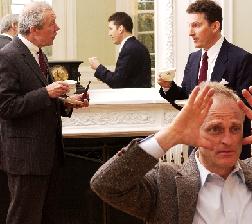SEARCH CurtainUp
REVIEWS
FEATURES
NEWS (Etcetera)
LISTINGS
Broadway
Off-Broadway
BOOKS and CDs
OTHER PLACES
Berkshires
London
Los Angeles
Philadelphia
Elsewhere
QUOTES
TKTS
LETTERS TO EDITOR
FILM
LINKS
MISCELLANEOUS
Free Updates
Masthead
NYC Weather
The Fly-Bottle by Elyse Sommer
|
What is your aim in philosophy? To show the fly the way out of the bottle.
---a line from philosopher Ludwig Wittgenstein's Philosophical Investigations inspired by a practice followed by Viennese pub keepers of sticking empty beer bottles upside down under the bar which would cause flies to fly into the bottle to g backward to get out. |

Dennis Krausnick, David Demke and (front) Michael Hammond
(Photo: Kevin Sprague )
|
This new play tagged as a comedy of philosophy had several workshop performances last year at MASSMoCA and Boston Playwrights' Theatre for several workshop performances as part of the Berkshire County-wide Vienna Project (originally titled Wittgenstein vs. Popper: The Main Event). An enlarged and revised version of the script directed by Tina Packer will now play at Shakespeare & Co. through August with a trio of company regulars playing three of the early twentieth century's leading philosophers: Michael Hammond (Ludwig Wittgenstein), Dave Demke (Karl Popper), and Dennis Krausnick (Bertrand Russell).
I'll report back on the play after the May 24th opening. In the meantime, here's a brief summary of what it's about and details about the design team and how to obtain tickets: The drama is based on what has become known as the "poker incident" between Wittgenstein and Popper at the Moral Science Club in England on October 25, 1946. A venerable institution at Cambridge University, the Club was the melting pot for visiting philosophers to discuss their latest research with students and professors. It seems that Wittgenstein, the club's chairman and Popper the invited speaker, had never met before and engaged in a heated exchange that culminated in Wittgenstein's vigorously gesturing with (some say brandishing) a poker that hung by the fireplace. Eyewitness accounts differ considerably, and the play confronts this disparity by examining the event from multiple perspectives, one being that of Bertrand Russell, the eminence grise of British philosophy, who had a profound impact on the lives and thinking of both Popper and Wittgenstein. Those ten minutes at the Moral Science Club have been made the subject of memoirs, articles, a best-selling book, and now this full-length play which according to its author scrutinizes "the triangle of mutual mistrust and respect between these three philosophers,"
Here's a capsule biography of the three philosophers:
SIR KARL RAIMUND POPPER (1902-1994) was one of the great polymaths of 20th century scholarship. He wrote with equal ease on quantum mechanics, music, sociology, and probability theory. He is famous for espousing a philosophy of critical realism, according to which we gain in knowledge and understanding by opening our views to criticism and revision. Those who knew Popper describe him as an insufferable megalomaniac who would be enraged by the slightest dissent.
BERTRAND RUSSELL, 3rd EARL AMBERLEY (1872-1970) philosopher, social activist, and Nobel laureate, was one of the great public intellectuals of the 20th century. One of the founders of the analytic tradition in Anglo-American philosophy, he wrote beautifully and exhaustively, promoting the virtue of happiness through calm, detached reasoning. Unable to realize this virtue himself, Russell married four times, quarreled with his friends, and emotionally abused his children and grandchildren.
LUDWIG WITTGENSTEIN (1889-1951) published only one book of philosophy, totaling 70 pages, during his lifetime, and yet is regarded as one of the greatest geniuses the discipline has ever known. His later philosophy emphasizes that human understanding is grounded in shared practices and conventions, such that we must understand others if we hope to understand ourselves. Wittgenstein himself shared very little in common with others, and his eccentricities alienated him from all but a small handful of close friends. (next)
| The Fly-Bottle
Written by David Egan Directed by Tina Packer Cast: Dave Demke, Michael Hammond, Dennis Krausnick Costume Designer: Govane Lohbauer Lighting Designer: Nathan Towne-Smith Scenic Designer: Bob Lohbauer Running time: 90 Minutes, without intermission Shakespeare & Co., Spring Lawn Theatre, 70 Kemble St, Lenox, 413 637-3353; www.shakespeare.org. 5/16/03-8/24/03; opening 5/24/03 $27-$42 with reserved seating; Student, Senior, Group Rates, and Rush Tix available. Wheelchair accessible. Reviewed by Elyse Sommer based on 5/24 press opening performance |



6,500 Comparative Phrases including 800 Shakespearean Metaphors by CurtainUp's editor.
Click image to buy.
Go here for details and larger image.


